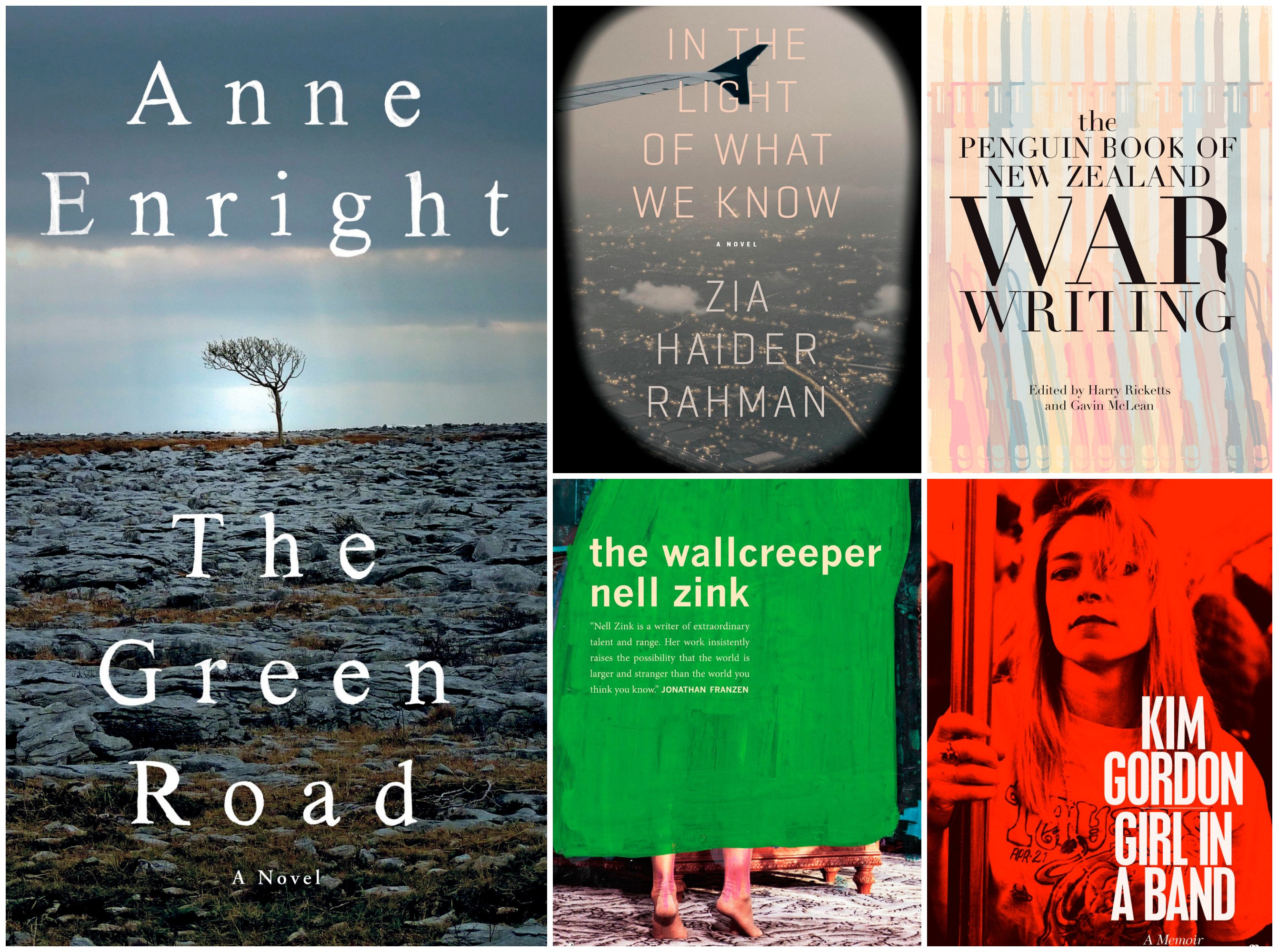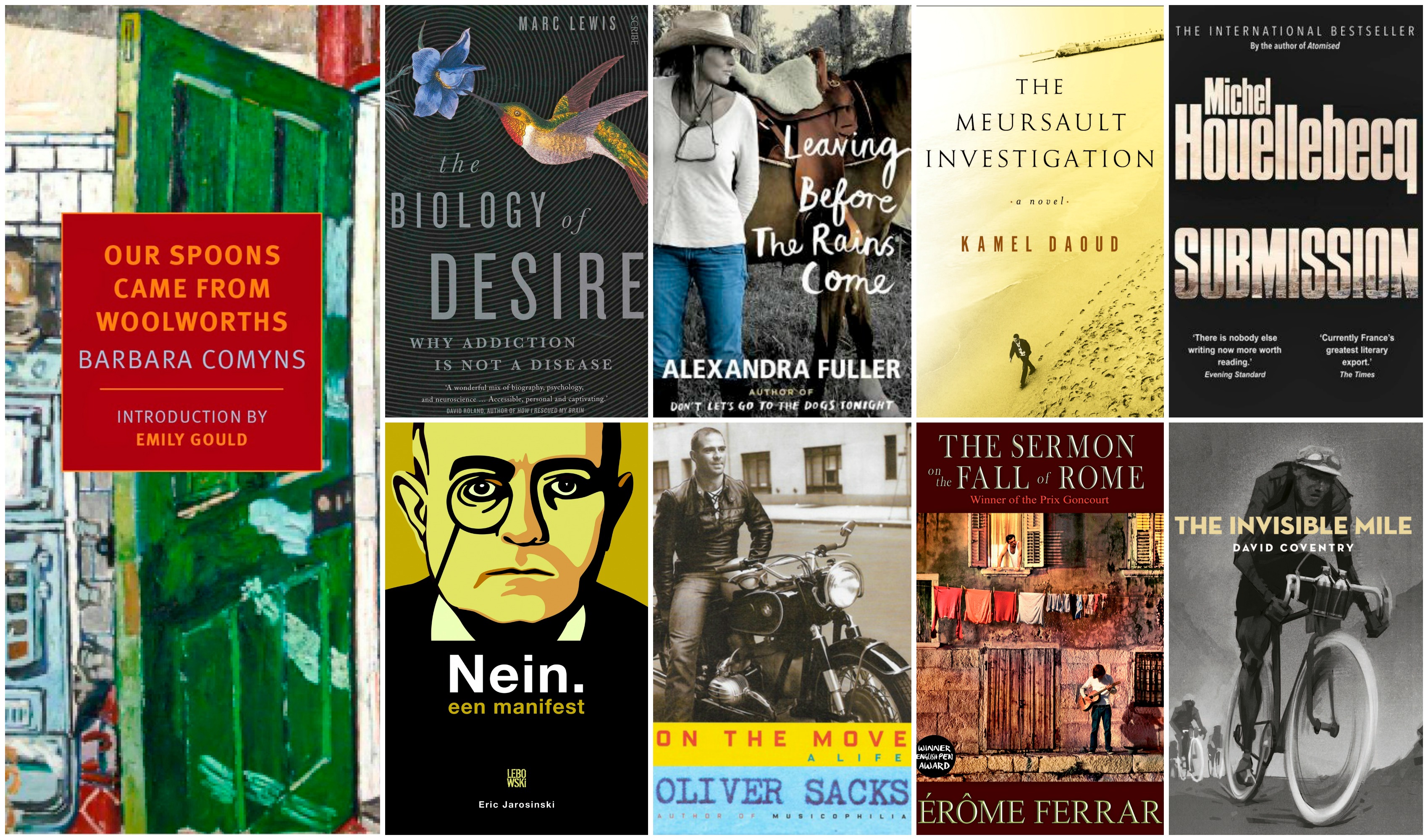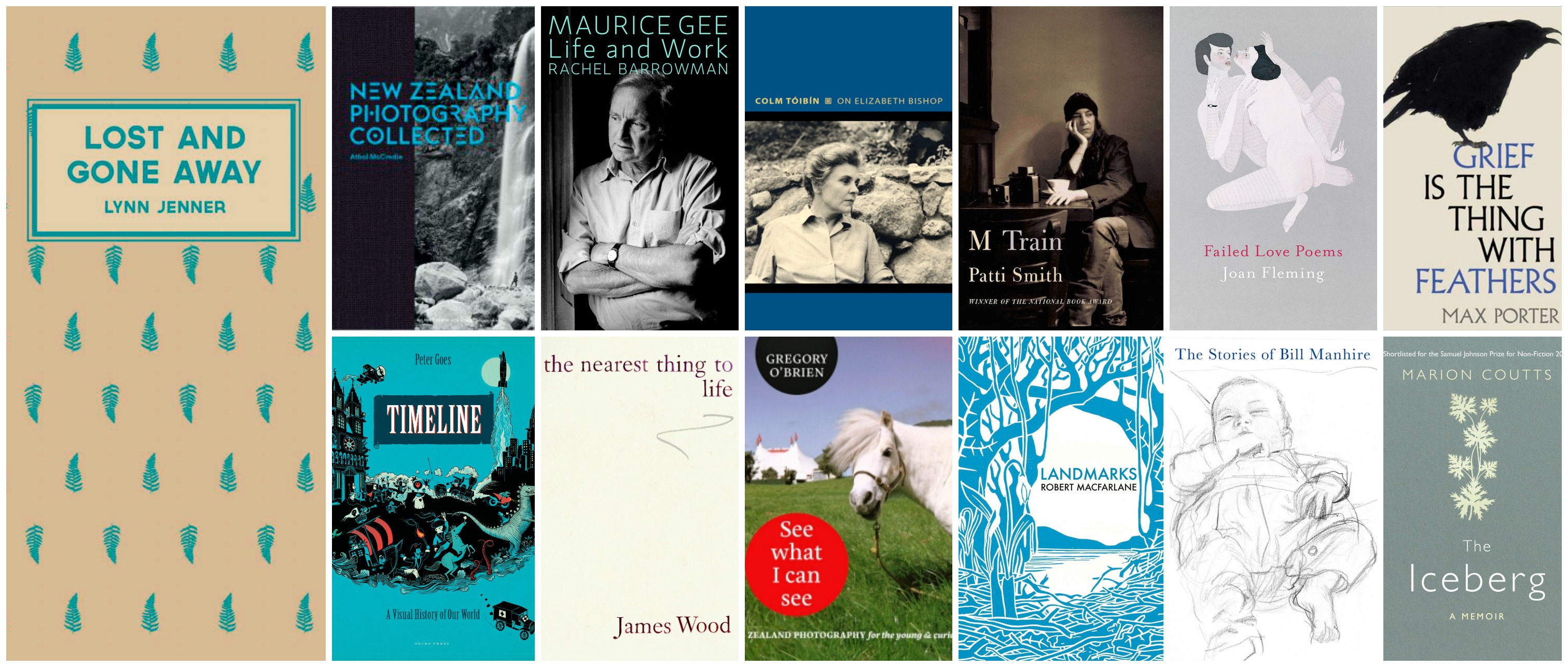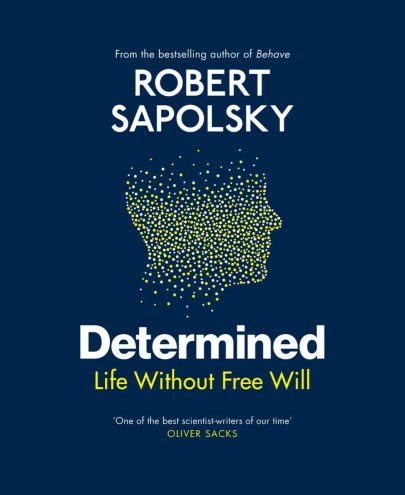Dec 8, 2015 Books
None of the best books of 2015, according to our critics, made it onto the shortlist for the Man Booker Prize, despite it supposedly being the foremost award for literature in English. To redress such scandalous neglect, we asked Noelle McCarthy, John Sinclair and Metro books editor Susanna Andrew to present their own best-of-the-year lists.
This article was first published in the December 2015 issue of Metro.
Noelle McCarthy’s favourite books of 2015
In a good year for family sagas (take a bow, Jonathan Franzen and Anne Tyler), the standout is Anne Enright’s blackly hilarious account of a reunion in the west of Ireland, The Green Road.
Enright has an unrivalled ear for the special language — half said, half unspoken — that siblings use to wound one another, not to mention the crushing timbre of parental disappointment. And it’s all on show here, with the bonus of one of the year’s best characters in ageing matriarch Rosaleen Madigan, who starts out fearsome but slips back into the past and grows ever more vulnerable. (This is the book, according to the consensus of Metro writers, that should have won the Booker — Ed.)
Zia Haider Rahman’s In The Light of What We Know is not without flaws — a weary-traveller-returns set-up that’s never paid off properly and wafer-thin female characters, to name but two of them — but it’s still a magnificent first novel.
The title is deeply ironic, the roster of settings is straight out of a Bond movie — New York, Bangladesh, London, Afghanistan, Tuscany, Oxford — and the author’s ambition is not confined to geography.
A dizzying array of subjects — friendship, race, politics, philosophy, the history of mathematics and the finer points of carpentry, to name but some — are pressed into service in order to examine the stories we tell ourselves to make sense of the world and our place in it. The unreliable narrator is a useful if creaky construction, but what a narrator he is!
Zafar is a savant of Bangladeshi origin, a man with a shady past and what seems like a limitless supply of physics conundrums. For him, love and science are equally spiritual, subjective conclusions based on the mass of information corralled inside the mind, inadequate defences against the ache of being human. He’s not all that impressed with books, either, although he’s in one, but he concedes to his friend that there’s a certain value in literature. “Why not think of a book in the same way you think of a map or a translation? It’s not perfect, far from it, but it’s something.”
As for novelist-of-the-moment Nell Zink, Mislaid may be the more famous of her books but The Wallcreeper, her first, is my favourite. Zany and cartoonish, it’s a chronicle of a young woman’s misadventures, sexual and otherwise, in continental Europe which zips along at a breakneck speed, merrily subverting societal norms and reader expectations in equal measure. Extra marks for the most surprising opening sentence of this year, or possibly any.
The Penguin Book of New Zealand War Writing is a massive, kaleidoscopic anthology, put together with an enjoyably light touch. The historical sweep extends from Murderers Bay in pre-colonial Aotearoa to present-day Basra, taking in well-known sites of battle and commemoration (Gallipoli, Northern France) and also wars that divided Kiwis, in Vietnam, Korea and Iraq.
Pairing a literature professor (Harry Ricketts) with an historian (Gavin McLean) as editors means there’s a lively focus on different forms of writing. The oral histories collected by Jane Tolerton provide great insights to the perspectives of ordinary soldiers; all the more devastating for their humility and understatement.
Some of those who went to war were poets, however. Denis Glover’s Leaving for Overseas, with its gorgeous description of soldiers on the ocean “Swung on the arc of war towards older islands”, is given added poignancy by the knowledge that he fought on the beaches of Normandy. Likewise John Mulgan’s experience fighting with Greek partisans against the Nazis informs his portrait, in Old Wars, of an ageing soldier’s “fever of recall”.
As Kim Gordon, totemic feminist, bass player and darling of Riot Grrrls every-where, once put it: “People pay money to see others believe in themselves.” But lord knows there’s a dark allure to watching the mighty brought low. Some of the interest in her book Girl in a Band, naturally enough, focuses on what she has to say about her split from Thurston Moore, her former partner and colleague over their three decades in the legendary band Sonic Youth.
Gordon satisfies voyeuristic curiosity by putting the end at the beginning; the first chapter is an unstinting account of how she survived the weirdly public intimacy of their final live performances together, bolstered by Xanax and her rage at her soon-to-be ex’s “rock star show-boating” with a younger woman. “The end of my marriage was a private thing, and watching Thurston show off his new independence was like someone rubbing grit in a gash.” Ouch.
Once Moore’s been dispatched though, Girl in A Band really comes into focus. Gordon’s an artist first, a musician second, and the rigour with which she interrogates her own creativity is engrossing.
Life, with some laughs – John Sinclair’s picks
The year’s highlights: the pair of books I reviewed last issue: Kamel Daoud’s The Meursault Investigation and Michel Houellebecq’s Submission.
The former explores the painful legacy of casual racism, where violence becomes the natural “language” of inner alienation, and the latter peers into a near future where an Islamic party takes over the Élysée Palace, promising not merely to restore France to its imperial glory but to establish a new Pax Romana founded on the teachings of the Prophet. Squirmingly funny, as satire should be, and resonating all the more strongly right now.
Read more: John Sinclair compares The Meursault Investigation with Submission.
Something lighter? Try JérÔme Ferrari’s The Sermon on the Fall of Rome, 2013 winner of France’s pre-eminent lit award, the Prix Goncourt. Two young philosophy students forsake their books for a bar in Corsica, to test out the hypothesis that we live in the best of all possible worlds (part of Leibniz’s proof of the existence of God, but you already knew that).
If only all academic research could involve lashings of alcohol, attractive waitstaff and the kind of rambunctious characters usually played, in the movie adaptation, by Gérard Depardieu. As the title alludes, all this is juxtaposed with St Augustine’s sermons to his flock in North Africa as they observe with horror the barbarian tide sweeping away civilisation as they have known it. Whimsical and at times rather too sketchy, but don’t let that hold you back. It’s an immensely entertaining take on a question the French are good at asking: how to live well in a world that’s so fucked.
It’s an immensely entertaining take on a question the French are good at asking: how to live well in a world that’s so fucked.
France, interestingly, is the setting for the year’s most interesting New Zealand novel, David Coventry’s The Invisible Mile, soon to be published in the UK by Picador. It’s the story of the 1928 Ravat-Wonder team, the first English-speaking team to ride the Tour de France, told by the sole Kiwi in a group of Australians. Best read in a rush, with a glass of French red, since as the narrator unravels under the stress of an extreme sport, so too the narrative unravels, like a bicycle that’s shedding parts after being thrashed for 3500 kilometres.
Forsaking the Old World, we head south, to Leaving Before the Rains Come, Alexandra Fuller’s latest memoir of growing up white in southern Africa. Beginning in 2003 with the award-winning Don’t Let’s Go to the Dogs Tonight and continuing with Cocktail Hour Under the Tree of Forgetfulness, Fuller has already given us her precarious childhood: Uzis at the dinner table, guerrillas in the bushes, a bipolar mother and a gin-soaked father spouting droll one-liners and frontier wisdom of questionable value, while confronting death and disfigurement by violence, natural disaster, hippo-strike or hideous insect-borne diseases.
This latest instalment is smart, funny and often profound without seeming self-indulgent. It describes Fuller’s marriage to an American adventure-tourism guide, whose attraction is that he does dangerous things but with the safety-catch on. Relocation to the US and three children follow, but happy ever after? If you’ve followed Fuller’s story, you will suspect not, and you’d be right.
Sticking with memoir, the late Oliver Sacks, one of the finest and kindest minds of his generation, has bequeathed us On the Move: A Life. It’s the follow-up to Uncle Tungsten: Memories of a Chemical Boyhood, and relates Sacks’ career as a clinician and writer who, in books like Awakenings and The Man Who Mistook
His Wife for a Hat, managed not only to make neuroscience accessible, but to hold up the functions and dysfunctions of our brains as a mirror to our humanity.
It’s a story of motorbikes, open-air weightlifting, countless patients, coming out gay in later life, being played by Robin Williams, and most of all the thirst for knowledge of what makes our tics, so to speak.
Dopamine, the chemical Sacks famously used to “awaken” patients locked in a catatonic state, features again in The Biology of Desire: Why Addiction is Not a Disease, by Marc Lewis. Lewis became addicted to heroin while a GI in Vietnam (who wouldn’t?) and observed that a good proportion of his comrades simply walked away from the drug as soon as they returned home, apparently without withdrawal symptoms and without relapse.
It’s a fascinating account of how our brains turn pleasure into compulsion and desire into self-destructive obsession. Dopamine, the hero in Awakenings, turns villain here, whether the stimulant is meth, alcohol or sugar, all of which is useful to understand if you’re the designated driver over the summer or in charge of kids who seem unable to live without their phones or consoles.
As an antidote to overdosing on sugary Christmas cheer, try Nein: A Manifesto by Eric Jarosinski. Endorsed by hip philosopher Slavoj ŽiŽek and launched on Twitter, it’s a quick read you’ll want to take slowly, maybe even to the point of memorising the quirky aphorisms/tweets/haiku featured on each page. (My favourite: “There is always hope — just not for us.”) Life-affirming pessimism for anyone wanting to think like a European savant without having to wade through all that turgid prose.
Finally, once a month in my household the clocks are stopped, the telephone cut off, the dog given a juicy bone and the kids a tin of baked beans, while I unwrap the latest NYRB classic and devour in one sitting a meal of ambrosia from the past. (John Williams’ Stoner and Renata Adler’s Speedboat were recent NYRB rediscoveries.)
Life-affirming pessimism for anyone wanting to think like a European savant without having to wade through all that turgid prose.
The latest in this literary degustation is Our Spoons Came from Woolworths, by Barbara Comyns, first published in 1950, a story of naivety, sex and pet newts that starts out as a rather fey account of penniless artists in 1930s London before switching gears into — let me say as a man, with all due deference to the nation’s mothers — the most harrowing account of over-medicalised childbirth I’ve ever read.
Good enough to hug – Susanna Andrew’s picks
Reading a good story, the American novelist Ben Marcus said recently, is like being wrapped up tight in a blanket and given a wild ride around the house.
Here’s that ride. The Stories of Bill Manhire pulls together five previous prose books by Manhire, along with some previously unpublished and uncollected works: a royal visit, a childhood as the son of a South Island publican, a visit to Antarctica… Manhire’s world is so persistently delightful, so full of the peculiar in the midst of the everyday, I wanted to pick it up and hug it with pleasure.
Manhire himself reviewed Robert Macfarlane’s Landmarks in September. It sits in the “natural world” genre, along with Helen Macdonald’s bestseller H is for Hawk, but Macfarlane’s examination of the relation-ship between language and landscape is done with such “lyricism and exactitude” it finds many of those other books, including Macdonald’s, a little too susceptible to sentimentalism.
Macfarlane’s account of the ways we name and misname our physical world is full of treasure and for most readers, said Manhire, it will have a resonant afterlife.
My list is light on novels, which this year I seem to have read fewer of than usual. Possibly that’s because of New Yorker critic James Wood’s memoir The Nearest Thing to Life, which made me feel I was reading them anyway. His account of how novels have shown him the way to live makes him the David Attenborough of the literary world: narrating the narration, third-wheeling inside a novel between the writer and the reader.
But one novel that did stand out, for the squeeze it gave my heart, was Max Porter’s debut Grief Is the Thing with Feathers. A densely poetic, staccato-sentenced novel set in London, it’s about grief, yes, but it’s too funny and inventive to conform to the usual tenets of the genre. Even so, I don’t think I’d give it to the recently bereaved.
Also in the pain game, Marion Coutts’ The Iceberg is a killer. Coutts was married to the Independent’s art critic Tom Lubbock, whose own book Until Further Notice, I Am Alive chronicled his diagnosis and decline from a rare brain tumour that affected his ability to use language.
Coutts’ memoir, written in the present tense and winner of this year’s Wellcome Book Prize, is intense, unafraid and astonishing.
Colm Tóibín’s On Elizabeth Bishop is a meditation on the life and poetry of Elizabeth Bishop in which, through mapping the poet’s life onto her work, it also discloses a whole lot about Tóibín himself. He gets her story, and we get his. It’s a beautiful matrix of understanding.
Many write about loss, but few with such skill as New Zealand writer Lynn Jenner in Lost and Gone Away. A collection of pieces centred on loss, absence and things mislaid and gone, it spans different cities and centuries and evolves into a profound, philosophical and wholly original inquiry into the nature of the Holocaust.
Read more: Sue Orr’s review of Rachel Barrowman’s Maurice Gee: Life and Work
The big literary biography of 2015, Rachel Barrowman’s Maurice Gee: Life and Work, was reviewed in September by Sue Orr. “It’s only when a biographer tackles the enormous, painstaking task of assembling the metadata — a lifetime of achievements, failures, thoughts and deeds — that we realise how much or how little we already know about the subject in question. In Gee’s case, it turns out to be the former.”
The book contains psycho-sexual revelations about Gee in his formative years, and yet despite that, Orr said, Barrowman’s “finest achievement [is] the creation of a compelling narrative out of an already well-documented life”.
Officially deified rocker Patti Smith’s memoir M Train, her follow-up to Just Kids, is a meandering but strikingly poetic portrait of her life, with more mindfulness to be found in its pages than in an armload of colouring-in books.
Not just for the kids, Timeline is such a genius idea: a picture book of the entire grand human history of the world. The whole shaboodle, more or less: cave dwellers, medievalists, dynasties, kingdoms, battles and wars. Danish writer and illustrator Peter Goes has given his book a glorious arc, with its spread of information beautifully condensed across time.
Kate De Goldi said recently the best way to learn about anything is to read a children’s book on the subject. Gregory O’Brien’s book of photographs, See What I Can See, is ostensibly for the young but it’s also a lovely thing for the rest of us to gaze at and read.
Digital photography has made me hopelessly blasé about using a camera, but Athol McCredie’s enormous New Zealand Photography Collected has made me think about what precisely it is that I want to record. The book is a stunning visual history featuring more than 350 photographs from the national collection at Te Papa Tongarewa, providing not just a new history of the practitioners’ work but a record of how New Zealand has changed.
And poetry? The discovery for me this year was Joan Fleming. Her first book, Failed Love Poems, is a sexually charged, slyly witty and beguilingly controlled commentary on (to para-phrase Elizabeth Bishop) “the love coming in and the love not at home”.








